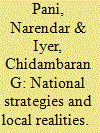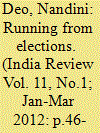| Srl | Item |
| 1 |
ID:
112109


|
|
|
|
|
| Publication |
2012.
|
| Summary/Abstract |
This article examines the impact that national economic policies adopted during Indira Gandhi's final term in office (1980-84) had on four "national" social groups, namely the big industrialists, the middle class, the rich peasantry, and the poor. The study argues that the Congress (I) chose the former two as its major allies, while the rich peasantry and the poor were relegated to a secondary position. In the process, the focus of India's strategy of development shifted from the agrarian to the industrial sector, and from the rural to the urban world.
|
|
|
|
|
|
|
|
|
|
|
|
|
|
|
|
| 2 |
ID:
112108


|
|
|
|
|
| Publication |
2012.
|
| Summary/Abstract |
Despite sporadic attention paid to the case for "shock therapy," the conceptualization of the implementation stage of policy making does not always get the attention it deserves. As a result there is inadequate understanding of the precise role this conceptualization plays in the transformation of a policy initiative into practice. This article draws on some of the insights of Amartya Sen, in another context, to identify different approaches to the conceptualization of the implementation of policy initiatives. It goes on to explore the consequences of using what we have termed the Greenfield approach in a reality marked by diversity in social, economic and political relations. It does so using the experience of the working of the Mahatma Gandhi National Rural Employment Guarantee Scheme in the south Indian state of Karnataka.
|
|
|
|
|
|
|
|
|
|
|
|
|
|
|
|
| 3 |
ID:
112110


|
|
|
|
|
| Publication |
2012.
|
| Summary/Abstract |
The first wave of feminism in India was closely connected to electoral politics, while the second wave turned away from party politics. This resulted in a growing marginalization of feminist concerns from the public agenda. There is a strong relationship between movement success and electoral engagement. This article reviews the history of feminist interventions in electoral politics and demonstrates that early victories for women depended on their participation in party politics. I argue that the creation of the autonomous women's movement has had a diminishing effect on women's progress in recent years. A number of paths remain available to the women's movement to engage with political parties and political leaders. Staying outside the electoral arena has not served Indian feminism well.
|
|
|
|
|
|
|
|
|
|
|
|
|
|
|
|